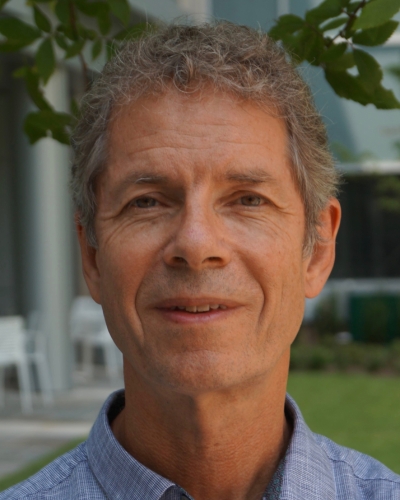
Emory biophysicist Laura Finzi
The APS honors only about a half of a percent of its members with the Fellows distinction. Finzi’s recognition is for “pioneering work on magnetic tweezers to resolve the difference between full polymer elastic theory and the simplifying freely jointed chain model and to demonstrate the key role of DNA supercoiling in transcription regulation, and for using tethered particle motion to study genetic switches.”
Heaven is being recognized as an APS fellow for “studies of the electronic structure and bonding of compounds with f-block elements using high-resolution gas-phase spectroscopy and quantum chemistry calculations, and for characterization of the anomalous bonding mechanisms of beryllium.”
They join just nine fellows previously awarded to Emory faculty.
“I am deeply honored by this award,” Finzi says.
In 2019, Finzi was awarded a Major Research Instrumentation NSF grant to purchase a correlative optical tweezers and confocal microscope, called C-Trap. This facility is being leveraged in the new Center for Molecular Mechanobiology at Emory.
She also authored a 2022 paper with other researchers in her lab that, using used atomic force microscopy, showed how gene transcription navigates roadblocks from DNA proteins.
The insight moves researchers closer to understanding the role gene transcription may play in diseases such as cancer as well as help design synthetic regulatory circuits to control gene expression.
The Biophysical Society has invited Finzi to speak at and chair a symposium, ‘The fluid versus gel nature of the genome,’ at its 68th meeting in February in Philadelphia.
Finzi’s public work includes editing the special “Supercoiling in DNA-protein interactions” issue of Biophysical Review in 2016 and serving as a member of the Biophysical Society’s executive committee, program committee and council.
Now President-Elect of the Emory College Senate and member of the group’s Executive Committee, Finzi is also the co-founder and co-chair of Women in Science at Emory (WISE) and serves as founding chair of the Physics Department’s Diversity, Equity and Inclusion Committee.

Emory physical chemist Michael Heaven
Heaven’s studies of f-block elements are focused on actinides, elements from atomic number 89 to 103, which are a mostly radioactive group that is of central importance for all matters related to nuclear energy.
The hazards and costs of experimental study of actinides limit our understanding of them. Heaven’s research centers on the experimental recording of benchmark data of small actinide-containing molecules that can be used by theoreticians to validate their methods.
These studies provide insight into how the electrons in the outermost valence orbitals of thorium and uranium determine the physical and chemical properties of these prototypical actinides.
Heaven also has conducted extensive research into understanding the bonding mechanisms of beryllium, a metal with unique properties which remains relatively unexplored due to its toxicity.
Because of the exceptional strength-to-weight ratios, the metal and its alloys are valuable parts in everything from mirrors and structural components of the NASA’s James Webb Space Telescope to spot-welding electrodes.
The remarkable durability of the metal also allows it to be used as a plasma-facing material in extremely high-temperature fusion reactors.
Heaven’s research group uses tunable lasers and mass spectrometers to characterize the structure and properties of small molecules containing beryllium, alkaline earth metals and other alkali metal atoms.
The research provides data for use in testing advanced theories of bonding and helps in the prediction of the properties of novel compounds for technological applications. The molecules under examination include diatomic molecules that have been proposed as units for quantum information storage (qubits) and quantum computing.
“I’m delighted to receive this honor, especially as a chemist being generously recognized by the physics community,” Heaven says.
